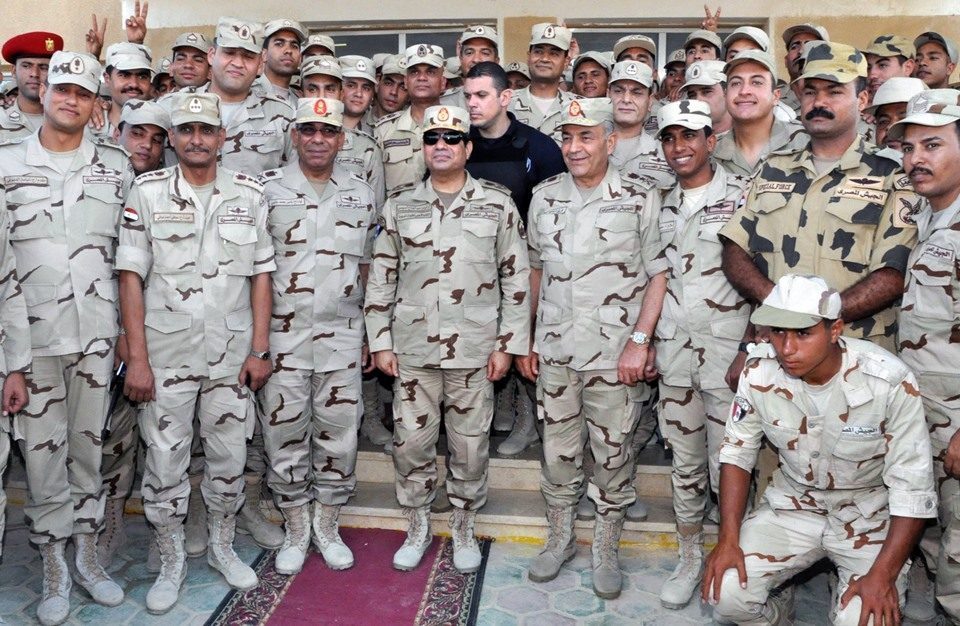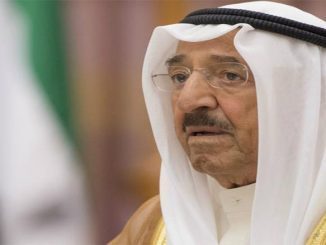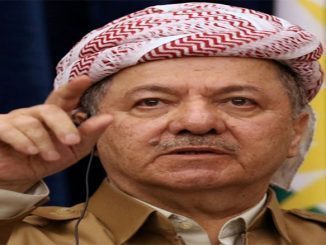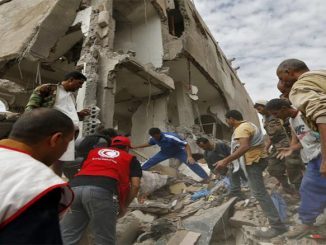
The phenomenon of the Egyptian Army’s control over the country’s economy has become agreed upon by researchers and those interested in the military concern.
Although the military institution maintains strict confidentiality of the information, data, and figures related to its economic activity, yet experts estimated the proportion of the army’s economy at about 50% of the State economy, while others said it was between 45% and 60%. In this context, experts questioned the statements repeated by Egypt’s Abdel Fattah Al-Sisi that the size of the army’s economy is no more than 1.5 percent of the country’s economy. However, Rashid Mohamed Rashid, the minister of industry and commerce under former President Hosni Mubarak, said in an interview with The New York Times that the army controlled 10 percent of the Egyptian economy.
First Axis: History of the economic empire of the Egyptian army
The history of building the economic empire of the Egyptian army can be divided into four stages:
First Stage: The economic empire of the Egyptian army began with the establishment of the National Organization for Military Production (NOMP), which included 18 factories, some of which used to provide military services, while others manufactured electrical appliances.
Second Stage: It was during the era of Field Marshal Abdel-Halim Abu Ghazala (Egyptian Minister of Defense in the late era of Anwar Sadat – in the late seventies of the last century – and the beginnings of the Mubarak era). Among the sectors that the army broke into during this period was the sale of land in South Sinai to investors (in dollar), according to Dr. Mustafa al-Fiqi, Mubarak’s information secretary.
Third Stage: It followed the appointment of Field Marshal Mohamed Hussein Tantawi as successor to Lt. General Yousef Sabri Abu Taleb in 1991. Tantawi rejected all attempts to dissolve the economic empire of the army. On the contrary, the army has, over the last ten years, taken control of many government companies that had been privatized, or cooperated with their new owners.
Fourth Stage: It came after the coup d’etat of July 3, 2013, and saw legislation and facilities for awarding civil economic projects to the army, most notably a decree issued by Adly Mansour, the acting president after the coup, in November 2013, allowing the government to abandon bids and tenders and assign projects to any company they want in urgent cases. In fact, the army has benefited from this decree so much, being awarded several projects, such as participation in the housing project of the UAE “Arabtec” (Arabtec, a construction company based in the United Arab Emirates, has announced plans to work with the military to build one million low-income housing units in Egypt. In this case, the Emirati Company reached out directly to the military and made it a full-fledged partner in the undertaking. The military was tasked with providing the land on which the apartments would be built.)
The Egyptian army has expanded its economic role after July 2013 due to the support provided by the Gulf countries after July 2013. According to a study by the Carnegie Endowment for the Middle East in November 2014, “In recent months, the military’s new political supremacy has been translated into unprecedented economic expansion. Military-owned companies and agencies are now active in sectors that had been traditional bastions of big business, such as construction and housing, infrastructure, and urban development, as well as modernization of the health sector. For many within the big business community, there are justifiable fears that the military, as the chief recipient of state stimulus spending, is crowding out the private sector from Egypt’s hoped-for economic recovery. Big businesses have been excluded from important economic activities and from the planned massive capital inflows intended to lead the Egyptian economy into recovery, higher investment, and employment.”
“According to an economic journalist, during the ten months that followed Morsi’s ouster, the interim government led by Hazem el-Beblawi assigned projects worth around 5.5 billion EGP (roughly $770 million) to the military, its agencies, and subsidiary companies.8 That sum includes large projects that were announced in the official gazette and others recorded by the press,” the study added. Among the most staggering of the work awarded to the military were a project worth 4.5 million EGP ($625,000) for the maintenance of 27 bridges and tunnels assigned to the military’s engineering agency, which was announced by a cabinet decree issued in November 2013; the development of 30 squatter settlements in Cairo and Giza (350 million EGP, or $49 million); the building of a government services complex in the Delta province of Gharbiya (240 million EGP, $34 million); and construction of two bridges in Qalyubia province (80 million EGP, $11 million). The military was also given the concession to collect toll revenue on some key highways, including a segment of the ring road around Cairo, for ninety-nine years, and the Cairo–Alexandria desert road, the busiest in Egypt, for fifty years. According to the same report, in March 2014 the minister of health said that 40 public hospitals would be built by the military.
Fifth Stage: After Sisi took office as president on July 3, 2014, Sisi worked to expand the economic empire of the army and involved the military institution directly in several mega projects such as the New Suez Canal, the new administrative capital, the fisheries projects, and so on.
Second Axis: Organs of the armed forces operating in economy
These institutions can be grouped into four main institutions:
First: National Service Projects Organization
The National Service Projects Organization (NSPO) was created by Presidential Decree No. 32 of 1979 following the signing of the Camp David Accords with Israel, with the aim of achieving relative self-sufficiency of the armed forces’ main needs and pump the production surplus into the local market, and participate in the country’s economic development projects through a sophisticated industrial production base. The NSPO has 21 companies covering a wide range of sectors, including construction, cleaning, agriculture, and food products. The products produced by these companies are sold on the local market.
Second: The Arab Organization for Industrialization
The Arab Organization for Industrialization (AOI) focuses on providing the needs of the Egyptian armed forces of defense equipment. However, the AOI activities were expanded to include civil projects in addition to its military projects. The AOI operates 11 factories and companies specialized in military and civilian industries, including, including the Arab-British Dynamics Company, the Helwan Aircraft Factory, the Helwan Engine Factory, the Kader Factory for Developing Industries, and the Sakr Factory for Developed Industries, as well as Semaf (obtained by the AOI from the public sector in 2002), which produces rail cars, rods and others, and factories of electronic products, renewed energy, and fertilizers. The AOI also owns partnerships with international institutions in the areas of civil manufacturing such as GE and Lockheed Martin, Mitsubishi, and others.
Third: The National Organization for Military Production
The National Organization for Military Production (NOMP) was established in 1984 with the aim of supervising the military factories. The National Organization for Military Production (NOMP), in cooperation with the Arab Organization for Industrialization, produces civilian goods and military products. It supervises more than 18 military factories, including several related to missile development, such as the Abu Zabaal Company for Specialty Chemicals, the Heliopolis Company for Chemical Industries, the Helwan Company for Workshop Tools, and the Kaha Company for Chemical Industries. The NOMP also owns shares in other companies such as the Petroleum Wealth Company, the International Pipe Industry Company (IPIC), the largest producer of oil and gas pipelines in the region, and the Arab Company for Computer Manufacturing (ACCM), a company for manufacturing of electronic boards, PCs and different types, TV set, in partnership with Nasser Al Kharafi Group.
The Armed Forces Engineering Authority
The Armed Forces Engineering Authority (AFEA) is one of the Egyptian Ministry of Defense agencies, specialized in the field of military and civilian infrastructure and construction. The AFEA has several departments, namely the Military Works Department, the Military Engineers Department, the Military Survey Department, the Water Department and the Management of Major Projects Department. Among the AFEA tasks are to contribute in the areas of development in Egypt and the establishment of major development projects, to remove the effects of local disasters and crises, to participate in infrastructure and construction of bridges, roads and fields, to participate in education by building schools, to participation in the fields of psychology and clearing of land mines and explosive remnants of war, to participate in the areas of political development and the development of sports facilities, to supply the civil sector effective cadres, to participate in the area of economic housing, to participate in the general planning of cities and the creation of Bedouin villages and Nubian houses, and to remove the effects of disasters and floods and earthquakes, as well as bombs and booby traps.
Third Axis: Economic advantages of the Egyptian army
Many experts are against the Egyptian army’s engagement in economic activities, its control of the country’s economy, and its monopolization of certain sectors, arguing that the main task of armies has nothing to do with the practice of economic activities, and that the continuous intervention of the Egyptian army in the fields of politics and economy has produced undesirable consequences over the course of three decades. In addition, many believe that the way the army manages the file of the economy in Egypt may be frustrating to other economic partners in the private and investment sector, and even the traditional government-owned companies that have undergone a wave of privatization in the late Mubarak era, when some of these companies were sold to military bodies, such as the SEMAF factory, which was seized by the army in 2002.
According to experts and observers, the Egyptian army practices unfair competition with private and government companies for the following reasons:
1- All military factories and companies are completely exempted from taxes and customs, which allows them to offer products and services at lower prices than their counterparts provided by private or even public companies.
2- A large number of the workers in the economic projects run by the armed forces are conscripts in the Egyptian army in the sense that they are not paid in light of the continuous rise in wages in most industrial sectors.
3- Counselor Adly Mansour issued two decrees in early 2014 whereby the state was exempted from conducting tenders and was allowed to assign projects to any company, body, or entity.
4- The armed forces, as the owner of State lands, acquire the land necessary for the establishment of their economic projects for free.
5- The armed forces can provide required security for their projects compared to any other party, which means that they have a greater ability to attract foreign partners.
- Companies controlled by the armed forces can benefit from subsidies that remain outside the records, as well as to enjoy greater freedom of maneuver in the absence of control.
7- In May 2011, the Supreme Council of the Armed Forces, which was then in power, amended the Military Justice Act, adding a provision that gives the military prosecution and judges alone the right to investigate the illegal gain of military officers, even after their retirement and assumption of civil positions.
Conclusion
The Egyptian military economy has gone beyond the military needs to include all kinds of products and services. Given the ambiguity surrounding the army, it is impossible to obtain any accurate figures regarding this. However, there is a consensus among a sample of people who were asked about the size of military dominance over Egyptian economy, saying that the Egyptian armed forces dominates almost all economic sectors. Also, the Egyptian military have shares in many government and private companies, especially in the fields of infrastructure. Even senior positions at a number of airports and other executive positions in municipalities have been allocated for several years to retired army officers.
*The article was written by: Mostafa Ibrahim, an Egyptian journalist and researcher, and was published in the Egyptian Institute for Studies (EIS) on June 7, 2018.



